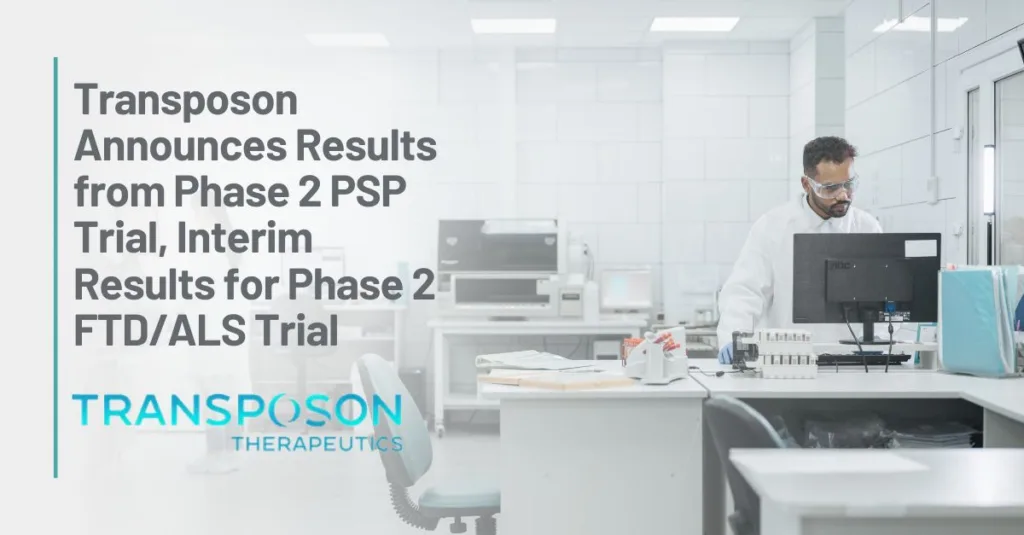Transposon Announces Results from Phase 2 PSP Trial, Interim Results for Phase 2 FTD/ALS Trial

The biotechnology company Transposon Therapeutics on February 12 released final results for its phase 2 clinical trial focusing on progressive supranuclear palsy (PSP) and interim results for its phase 2 trial focusing on FTD and ALS caused by inherited variants of the C9orf72 gene.
The trials are evaluating the drug TPN-101 as a treatment for FTD disorders. TPN-101 targets LINE-1, a virus-like DNA sequence, known as a retrotransposon. In contrast to the genes that encode proteins critical to cell structure and function, which are copied directly from DNA, retrotransposons can be copied from RNA through a process called reverse transcription. In brain cells, the reverse transcription of LINE-1 can trigger cell damage as well as harmful immune responses that contribute to neurodegeneration. By blocking an enzyme needed for reverse transcription, TPN-101 prevents its detrimental effects on the brain.
In the PSP trial, TPN-101 reduced levels of specific biomarkers of neurodegeneration and neuroinflammation, including neurofilament light (NfL), interleukin 6 (IL-6), and osteopontin, Transposon researchers reported. In PSP, NfL levels typically increase annually, while IL-6 levels are usually elevated. Osteopontin levels are related to cognitive deficits in people diagnosed with Alzheimer’s disease.
Additionally, participants treated with TPN-101 showed stabilization of PSP symptoms, according to measurements taken using the PSP Rating Scale.
The interim results for Transposon’s trial focused on ALS/FTD caused by variants in the C9orf72 gene showed that TPN-101 appeared to have an impact on biomarkers such as NfL, the protein tau, and osteopontin in this group as well.
“Transposon’s founding mission was to establish human proof-of-concept that dysregulation of retrotransposable elements in neurodegenerative diseases such as PSP, ALS, and Alzheimer’s disease can be addressed with a new class of LINE-1 reverse transcriptase inhibitors,” said Transposon’s founder and chief innovation officer Eckard Weber, MD. “The results obtained with TPN-101 in both PSP and ALS/FTD show for the first time that neurodegenerative diseases that involve LINE-1 dysregulation are treatable with a specific inhibitor of this important novel target. We look forward to advancing the development of TPN-101 into registration studies to address this devastating and rapidly growing disease category.”
Transposon’s phase 2 study of TPN-101 for treating C9orf72-related ALS/FTD is currently undergoing an open-label extension evaluating the drug without the use of a placebo. The extension will allow Transposon to collect additional data on TPN-101’s efficacy and safety before moving forward.
Transposon Therapeutics has engaged in the FTD Research Roundtable (formerly the FTD Treatment Study Group) since 2018 with Transposon’s chief medical officer, Andrew Satlin, MD, serving on the FTD Research Roundtable Steering Committee.
Researchers are making considerable progress in searching for treatments for FTD, with an increasing number of experimental therapies entering clinical trials. This month, Alector and GSK announced that the FDA granted their experimental treatment “breakthrough therapy” status, while Passage Bio announced promising initial results for its phase 1/2 upliFT-D trial evaluating an experimental treatment for FTD-GRN.
AFTD encourages people to enroll in the FTD Disorders Registry to find out more about clinical trial opportunities and to contribute to data that informs the way that researchers approach new tools and treatments for FTD.
By Category
Our Newsletters
Stay Informed
Sign up now and stay on top of the latest with our newsletter, event alerts, and more…
